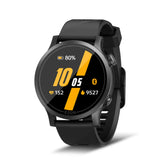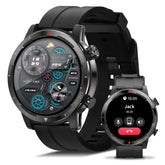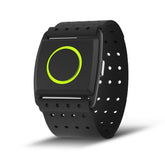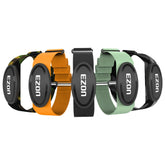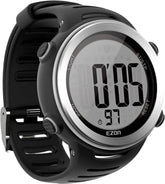Nutrition for Active Athletes: Fuel Your Workouts with the Right Food
For athletes, nutrition is the engine that powers performance—get it right, and you’ll train harder, recover faster, and crush PRs. This guide breaks down science-backed athlete nutrition strategies, showing how sports watches like step count watches and heart rate monitors turn guesswork into precision, tailoring your diet to maximize workout performance. From pre-workout fuel to post-session recovery, learn to eat like an athlete, guided by data and driven by results.
1. The 3 Macronutrients Every Athlete Needs
A. Carbohydrates: The Primary Energy Source
- Why They Matter: Convert to glycogen, fueling muscles and brain during high-intensity efforts (e.g., 1g carb = 4kcal energy).
-
Intensity-Based Intake:
- Endurance Sports (Marathons/Triathlons): 6–10g/kg body weight daily (e.g., 70kg athlete = 420–700g, focus on oats, rice, bananas).
- Strength Training: 4–6g/kg body weight, prioritizing complex carbs (quinoa, sweet potatoes) for steady energy.
- Sports Watch Insight: Use a step count watch to estimate daily activity—10,000 steps = ~500 extra carbs needed.
B. Protein: Repair and Rebuild
- Muscle Preservation: 1.2–2.0g/kg body weight daily (higher for strength athletes), divided into 20–30g doses every 3–4 hours.
- Best Sources: Chicken, eggs, Greek yogurt, lentils—pair with carbs post-workout for optimal absorption.
- Heart Rate Monitor Tip: Track post-workout heart rate recovery; slow recovery (e.g., >2 minutes to drop 20 BPM) signals increased protein need (add 10–20g).
C. Fats: Sustained Energy and Hormone Balance
- Endurance Fuel: 20–30% of daily calories from healthy fats (avocado, nuts, olive oil), especially for low-intensity, long-duration workouts.
- Avoid Before Intense Sessions: High-fat meals can slow digestion—opt for low-fat snacks 1–2 hours pre-workout.
2. Timing is Everything: Pre-Workout Nutrition
A. 3–4 Hours Before
- Meal Focus: High-carb, moderate-protein, low-fat (e.g., pasta with chicken and veggies).
- Sports Watch Link: Check your heart rate monitor for morning resting heart rate (RHR)—a higher RHR may mean smaller portions to avoid digestion stress.
B. 30–60 Minutes Before
- Quick Fuel: 30–60g carbs (1 banana + 1 tbsp peanut butter) + 100–200ml sports drink.
- Data-Driven Choice: If your workout is Zone 4–5 (HIIT/sprints), choose simple carbs (dextrose gels) for quick absorption.
3. Mid-Workout: Fuel to Sustain Performance
A. Endurance Events (>60 Minutes)
- Carbs: 30–90g/hour (1–3 energy gels, depending on intensity)—use your step count watch to estimate distance covered and adjust intake (e.g., 1 gel per 10K).
- Electrolytes: 500–1,000mg sodium/hour (salt tabs or electrolyte drinks) to prevent cramping—critical if sweating heavily (1L/hour loss).
B. High-Intensity Sessions (30–90 Minutes)
- Hydration Focus: Sip water/sports drink every 15 minutes; save solid food for post-workout.
- Heart Rate Insight: If heart rate creeps above Zone 4, take a 1-minute walk and consume 10g carbs (e.g., 1 energy chew) to reset.
4. Post-Workout Recovery: Repair and Rebuild
A. The Golden Window (0–60 Minutes)
- Nutrition Formula: 1.5g carbs/kg + 0.3–0.4g protein/kg (e.g., 70kg athlete: 105g carbs + 21–28g protein).
- Perfect Combo: Chocolate milk (carbs + protein) or a smoothie (spinach, banana, whey protein).
- Sports Watch Role: Sync with nutrition apps to log post-workout meals and track recovery metrics (HRV, sleep quality).
B. 1–2 Hours Later
- Balanced Meal: Prioritize lean protein, complex carbs, and anti-inflammatory fats (e.g., salmon, quinoa, broccoli).
- Heart Rate Monitor Tip: A elevated RHR post-meal may indicate larger portions are needed for future workouts.
5. Hydration: More Than Just Water
A. Pre-Workout Hydration
- 2 Hours Out: Drink 500ml water + electrolytes (1 pinch of salt) to ensure optimal fluid levels.
- Urine Check: Aim for pale yellow—dark urine means drink 200ml more.
B. During Workouts
- Sweat Rate Test: Weigh before/after training to calculate loss (1kg = 1L fluid needed, plus 200ml for safety).
- Electrolyte Ratio: 3:1 sodium:potassium in drinks (e.g., 300mg sodium + 100mg potassium per 500ml).
6. How Sports Watches Enhance Nutrition Planning
A. Track Calorie Burn with Precision
- Heart Rate Monitor: Accurately calculates energy expenditure based on heart rate, weight, and workout type—no more generic estimates.
- Step Count Watch: Adds non-exercise activity thermogenesis (NEAT) from daily steps, ensuring you adjust intake for total energy output.
B. Sync with Nutrition Apps
- MyFitnessPal Integration: Log meals alongside workout data to visualize calorie balance (e.g., a 2-hour run burns 1,200 calories—time to refuel!).
- Custom Alerts: Set reminders for pre-workout carbs or post-workout protein, guided by your watch’s schedule.
C. Recovery-Driven Nutrition
- HRV Analysis: Low HRV signals increased need for anti-inflammatory foods (berries, turmeric) and omega-3s (fish oil).
- Sleep Quality: Poor sleep? Boost magnesium intake (almonds, spinach) to improve recovery.
7. Sport-Specific Nutrition Tips
A. Endurance Athletes (Marathon/Triathlon)
- Carb Loading: 3–4 days pre-race, increase carbs to 8–10g/kg body weight (white rice, pasta) to maximize glycogen stores.
- Race-Day Breakfast: 2–3 hours out, eat 1g/kg carbs (oatmeal + honey) for sustained energy.
B. Strength Athletes (Weightlifting/HIIT)
- Pre-Workout: 50g carbs + 20g protein 90 minutes before to fuel power output and preserve muscle.
- Post-Workout: Prioritize fast-digesting protein (whey isolate) to kickstart muscle synthesis.
8. Common Nutrition Mistakes to Avoid
- Ignoring Electrolytes: Leads to cramps and poor performance—use your heart rate monitor to track intensity and adjust sodium intake.
- Overloading Fiber Pre-Race: High-fiber foods (whole grains, raw veggies) can cause bloating—opt for low-fiber carbs (white bread, bananas) instead.
- Skipping Post-Workout Protein: Delays recovery and increases muscle breakdown—set a watch alert to eat within 60 minutes.
Fuel Like a Pro, Perform Like a Champion
With athlete nutrition guided by sports watches and heart rate monitors, you’ll transform food into performance fuel, tailored to your unique needs. Whether you’re chasing a marathon PR or lifting heavier weights, let data from your watch optimize every meal, every sip, and every bite.
Remember, nutrition is the silent trainer that works 24/7—pair it with smart training and recovery, and you’ll unlock levels of performance you never thought possible. Gear up with a reliable step count watch and heart rate monitor, and let your diet become the edge that sets you apart.
EZON Watch: Professional sports technology brand
https://ezonwatch.com
https://ezonwatch.com
